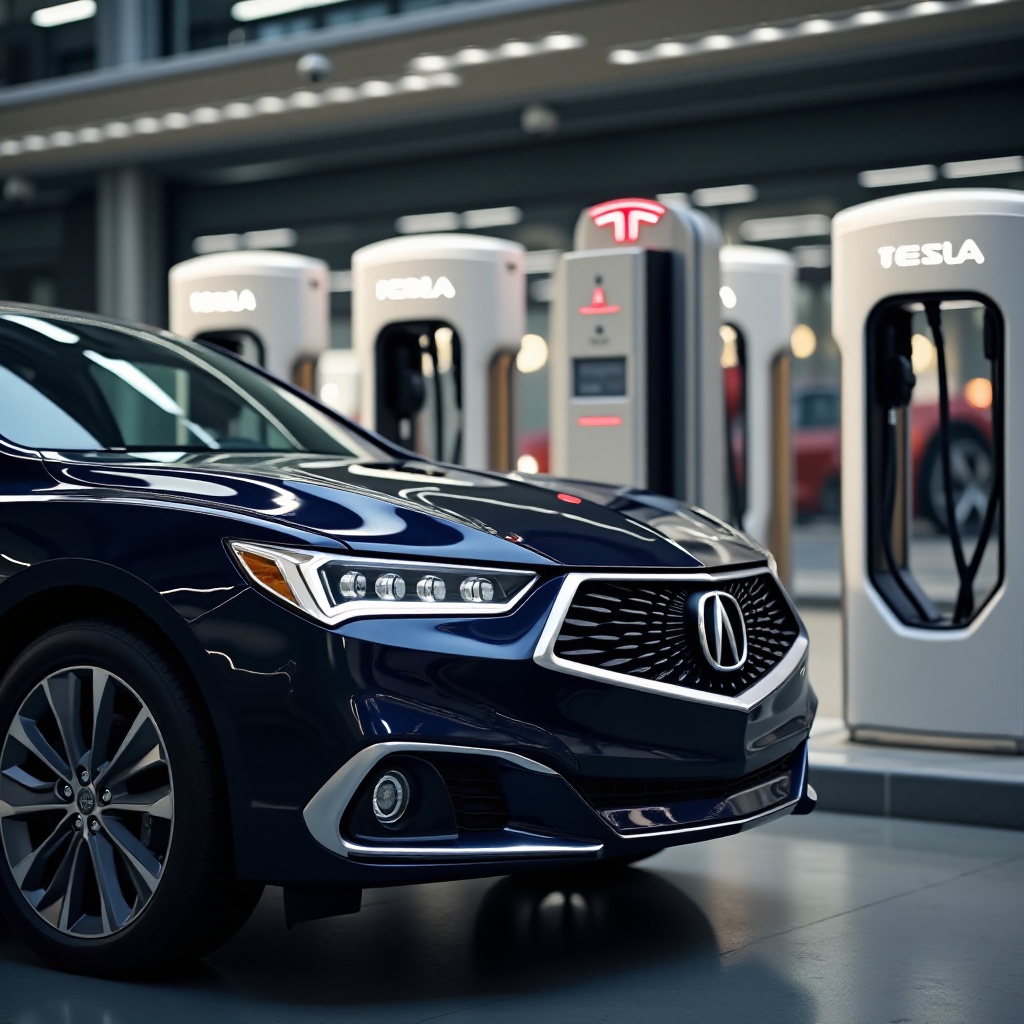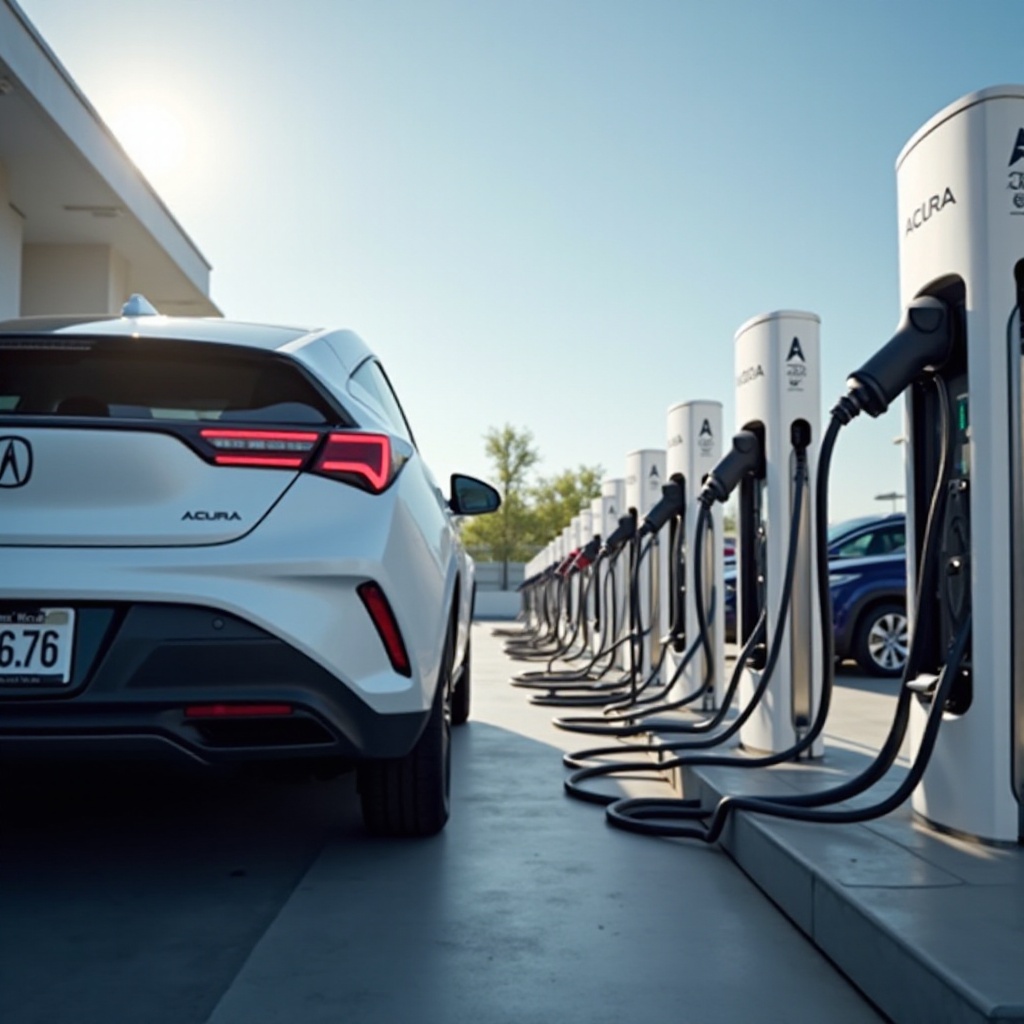Introduction
Electric vehicles (EVs) are taking over the market, with prominent players like Tesla setting the benchmark for charging infrastructure. As other automakers start producing their own EVs, the question arises: ‘Does Acura have access to Tesla chargers?’ While Acura is making strides in its electrification efforts, it faces unique challenges when it comes to charging.

Understanding Charging Standards
Before diving into compatibility issues, it’s essential to understand the different charging standards in use today. There are various types of charging connectors for EVs:
- Type 1 (J1772): Commonly used for slower, Level 1 and Level 2 AC charging.
- Type 2 (Mennekes): Widely adopted in Europe for faster AC and some DC charging.
- CHAdeMO: Used primarily for DC fast charging, identified by a large, round connector.
- CCS (Combined Charging System): Most popular for DC fast charging, compatible with both AC and DC.
- Tesla Connector: Exclusive to Tesla Superchargers and designed for both AC and DC charging.
These varying standards can create hurdles when trying to use one brand’s charger with another brand’s EV, affecting where, how, and how fast you can charge your vehicle.
Acura’s Electrification Efforts
Acura, Honda’s luxury vehicle division, is entering the EV market with vigor. Their recent models boast cutting-edge technology and sustainable powertrains. The Acura Precision EV Concept represents the brand’s vision for the future. However, for Acura to compete effectively, it’s crucial to understand how its vehicles interact with existing charging networks, including Tesla’s extensive Supercharger network.
Tesla Supercharger Network
Tesla’s Supercharger network is arguably the most comprehensive and fast-evolving infrastructure for EVs. It offers high-speed DC charging and is scattered across major highways and urban centers, making long-distance travel easier for Tesla owners. The exclusive Tesla connector is a barrier, preventing non-Tesla vehicles from utilizing this network – a significant point of discussion for non-Tesla EV owners, including Acura drivers.

Compatibility Issues and Solutions
Technical Aspects
The fundamental issue lies in the different proprietary connectors used by Tesla and other manufacturers. Tesla’s unique connector means that Acura’s current models, designed for Type 1 and CCS connectors, cannot directly plug into a Tesla Supercharger.
Adapters and Third-Party Solutions
Several companies have developed adapters that claim to bridge this gap, but their effectiveness and safety remain subject to scrutiny. Most options are typically:
- Adapters: Devices that convert a Tesla connector into a compatible plug for another EV.
- Third-Party Chargers: Some third-party chargers offer multiple connectors compatible with different vehicle types.
While these solutions offer a workaround, they are often expensive and may void vehicle warranties.
Potential Barriers
- Technical Complexity: Ensuring an adapter effectively manages the current and voltage differences.
- Warranty Concerns: Third-party adapters may void warranties, posing a gamble for new car owners.
- Accessibility Restrictions: Tesla may restrict access to their Supercharger network for non-Tesla EVs, preserving the exclusive benefits for their customers.
- Firmware Compatibility: Adaptability issues between Tesla’s software systems and other EV systems can complicate seamless charging.
Future of EV Charging Compatibility
To address these compatibility concerns, future collaborations and standardizations may be necessary. The industry could benefit from:
- Universal Chargers: Developing more universal charging standards.
- Partnerships: Inter-industry partnerships can allow shared use of charging networks.
- Software Integrations: Advancement in software could provide more adaptable solutions for cross-network compatibility.
The transition towards electric vehicles demands an emphasis on user convenience and interoperability, which can only be achieved through a harmonized approach to charging infrastructure.

Conclusion
As Acura makes significant advancements in the EV market, one of their critical considerations will be how to make charging as accessible and straightforward as possible for their customers. Currently, direct access to Tesla Superchargers remains restricted, but with evolving technology, partnerships, and adapters, these barriers may lessen in the future. Acura’s commitment to innovation could eventually lead to broader compatibility solutions that benefit all EV users.
Frequently Asked Questions
Can you charge an Acura at a Tesla supercharger?
Currently, you cannot directly charge an Acura at a Tesla Supercharger due to proprietary connector and software differences. Adaptors are available but come with caveats.
Are there adapters to use Tesla chargers for other EVs?
Yes, adapters exist, but they often come with technical and warranty risks. Always ensure the adapter is from a reputable manufacturer and consult your vehicle’s warranty terms before usage.
Will future Acura EVs be more compatible with different charging networks?
The goal is to move towards standardization. Acura, along with other manufacturers, is anticipated to enhance compatibility with different networks through advanced technologies and potential industry partnerships.
